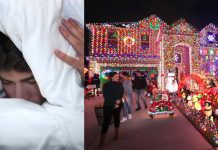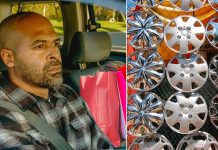

CLANCY OVERELL | Editor | CONTACT
Betoota’s most prominent neighbourhood gossips, Francesca Lupi, Natalia Ponticello, Paloma Boserio have been identified as the town’s greatest asset when it comes to identifying active COVID-19 cases.
A recent report by DICT (Diamantina Independent Contact Tracers) has found that the three elderly Italian women sitting on a heavily concreted patio in the Betoota Flight Path District have a higher success rate of identifying community transmission of coronavirus than the Federal Government’s $2m COVIDsafe app.

In fact, the study shows these three nonnas have identified more cases in the entire country than the flawed Singaporean-modelled software.
This follows the news that the NSW public transport tap-and-go card system has also picked up more active cases in Australia than the app.
Francesca, Natalia and Paloma have been congratulated by the town’s mayor, Councillor Keith Carton today – after successfully reporting three active cases in south-central Betoota.
The Nonnas say that these cases were identified by simply spending every minute of the day on Paloma’s patio listening for any neighbours that might be showing signs of COVID-19 symptoms with a dry cough or running nose.
This model of patio gossiping appears to be also showing signs of success in Brisbane’s New Farm and Sydney’s Leichhardt. Melbourne was also seeing positive results before their Nonnas were banned from visiting each other.
While some neighbours says they feel like their privacy has been violated by the snoopy old girls, The Mayor says that elderly ethnic gossips are no way near as intrusive as a federal government app that drains your phone battery while collecting your personal data for no real gain.
Makers of the Covidsafe app have had to overhaul the algorithm for determining close contacts to improve the functionality of the app on iPhones, as new data suggests it is working only 27% of the time on some Apple mobiles.
A table provided to the Senate by developers in June detailed test data from various devices running the app. It showed the app sending out and receiving beacons as infrequently as one in four times on the iPhone.
Early one in the second wave, Victorian Health Officials ceased using the app in contact tracing entirely, as the unreliability of the software became a hindrance to the overall process.
With hospitality venues taking the government’s failed contact tracing efforts into their own hands with QR Codes and sign-in sheets, Australians are also being urged to put their nonnas, yiayias and babas on the patios to help neutralise the community spread of the virus.
At time of press, Francesca had reverted back to Italian and was remarking on how chubby that young Filipino lady across the street was looking – and perhaps she was now pregnant out of wedlock.
MORE TO COME.










